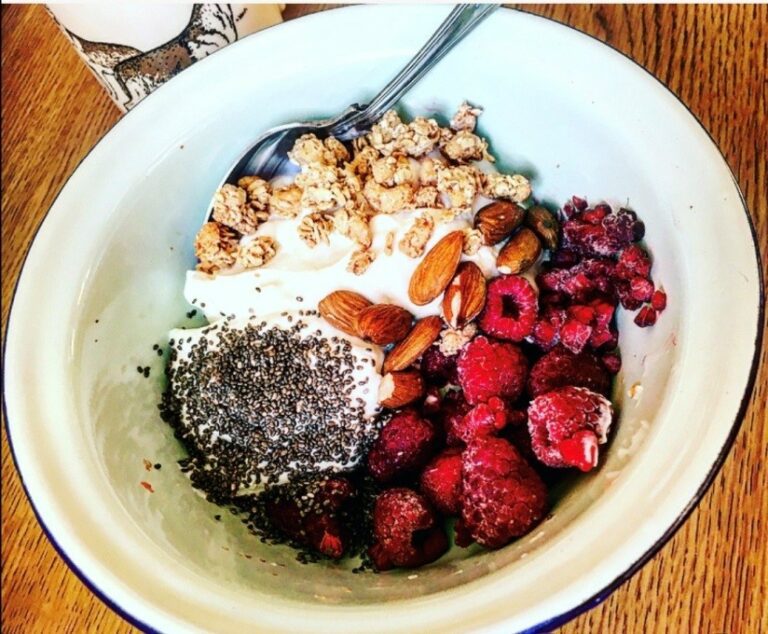[vc_row][vc_column][vc_text_separator title=”Recipe from Croí Dietitian, Meabh Durkin”][vc_row_inner][vc_column_inner width=”2/3″][vc_column_text]As many of us adjust to working from home, the reduced commute time does not translate into additional morning leisure time for most! It can be challenging at first to establish your new routine over the coming weeks but let’s start the day with our best foot forward and what better way than with a very simple, heart healthy breakfast.
Greek yogurt bowls make for a delicious and satisfying breakfast. The variations are endless and by using some key ingredients shown below we can create a low calorie, high protein and high fibre breakfast.[/vc_column_text][vc_toggle title=”Heart Healthy Greek Yogurt Bowl Recipe” color=”juicy_pink”]Ingredients:
- 40g frozen raspberries
- 200g 0% Greek yogurt
- 1 tsp. (5g) whole chia seeds
- 10-12 almonds
- 1 heaped dsrt. sp. (~10g) crunchy oat cereal.
Method:
- Simply heat the raspberries in the microwave for 40 seconds.
- Add the yogurt to a bowl and top with the berries and remaining ingredients!
Key Ingredients:
0% Greek yogurt:
Fat-free or low-fat Greek yogurt gives you the best bang for your buck as it’s low in calories while being high in protein. It also has a thick, creamy texture. You can use plain, natural or dairy free yogurts, however most flavoured yogurts are high in additional sugars. Looking at the nutritional panel on the carton, a low-fat yogurt is one that contains less than 3g of fat per 100g and a low-sugar yogurt (including both added and sugar naturally present in milk from lactose) is less than or equal to 5g (for natural yogurts) and 9g (for flavoured yogurts).
Frozen fruit:
Of course you can also use fresh fruit if you have it, however frozen fruit is a great staple to have in your freezer and often results in less waste. Raspberries or blueberries are a great low-sugar option. You can defrost them in the microwave and add them to the bowl warm.
Nuts and seeds:
Chia seeds and whole almonds are used in this recipe but flax, linseed, hemp, cashews, hazelnuts or walnuts are equally as good options. Nuts and seeds are loaded with heart healthy fats and low in saturated fat while also providing fibre which helps regulate blood sugar levels as well as reducing bad cholesterol levels, therefore improving heart health. They are also a great source of the antioxidant vitamin E and minerals such as zinc and magnesium. 100% peanut or almond butter is also a lovely alternative. Remember nuts are high in calories with a recommended serving of nuts being 40g.
Additional extras:
This recipe has a small amount of cereal added for some extra crunch. A high fibre bran, low sugar muesli or oats could also be added. However be mindful of your additional extras so they don’t add up to unnecessary added sugar and calories! Unsweetened desiccated coconut, cinnamon or a drop of vanilla essence make for great low calorie add-ons.
As a general guide, healthier breakfast cereals should contain no greater than 6g of sugar, 3g or less of fat and should have a fibre content of 3g or more per serving (usual serving of breakfast cereals is 30-40g).[/vc_toggle][/vc_column_inner][vc_column_inner width=”1/3″][vc_single_image image=”8896″ img_size=”500×475″][/vc_column_inner][/vc_row_inner][/vc_column][/vc_row]
